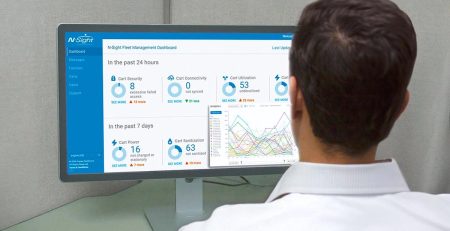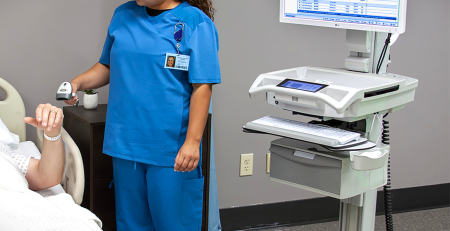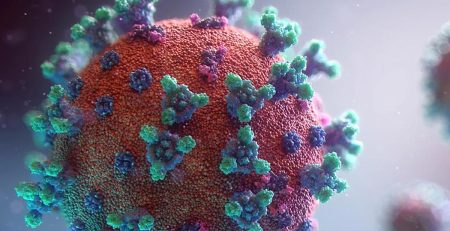What is a Health Information System? Understanding its Role in Modern Healthcare
The importance of efficient and effective management of health information cannot be overstated. A Health Information System (HIS) is at the core of this management, integrating various processes and technologies to facilitate all patient care and streamline operations in hospitals and other healthcare facilities.
This article explores what a Health Information System is, its components, benefits, and its critical role in hospitals.
Defining Health Information System
A Health Information System is a comprehensive framework that collects, stores, manages, and transmits health data. This data can include patient records, treatment histories, medication lists, laboratory results, and more. HIS encompasses a variety of information technologies and tools that support the various aspects of healthcare delivery, enabling healthcare providers to make informed decisions, improve patient outcomes, and enhance the efficiency of healthcare services.
Key Components of a Health Information System
Health Information Systems comprise several key components that work together to facilitate the collection and management of health data:
- Electronic Health Records (EHRs): EHRs are digital versions of patients’ paper charts, providing a comprehensive view of a patient’s health history. They allow healthcare providers to access and update patient information in real-time, improving communication, accuracy, and coordination of care. Read about the best practices for EHR documentation.
- Clinical Decision Support Systems (CDSS): CDSS provides healthcare professionals with knowledge and patient-specific information, intelligently filtered and presented at appropriate times, to enhance patient care. This can include alerts about potential drug interactions, reminders for preventive care, and guidelines for treatment.
- Health Information Exchange (HIE): HIE enables the secure sharing of health information across different healthcare organizations. This facilitates coordinated care, reduces duplication of tests and procedures, and improves the continuity of care for patients.
- Practice Management Systems (PMS): PMS helps healthcare facilities manage their daily operations, including scheduling, billing, and patient registration. These systems streamline administrative tasks, allowing healthcare providers to focus more on patient care.
- Telemedicine Solutions: With the rise of telehealth, many HIS now include telemedicine capabilities, allowing healthcare providers to consult with patients remotely. This is especially important in increasing access to care and improving patient convenience.
- Mobile Health Applications: Mobile health apps allow patients to access their health information, schedule appointments, and communicate with their healthcare providers directly from their smartphones. These apps enhance patient engagement, convenience, and empowerment.
How does Convergint support HIS?
Convergint- Innovative Medical has supported the integration of EHR and other health information systems with Computer Mounting Systems for decades. Not only do we supply tried and true computer carts & wall mounted solutions compatible with HIS, but we find unique solutions to align clinician workflow with EHR / EMR input. Examples include medication label printer & barcode scanner mounts, locking medication doors with detailed data tracking, RFID badge entry, and fleet management software with IT helpdesk integrations.
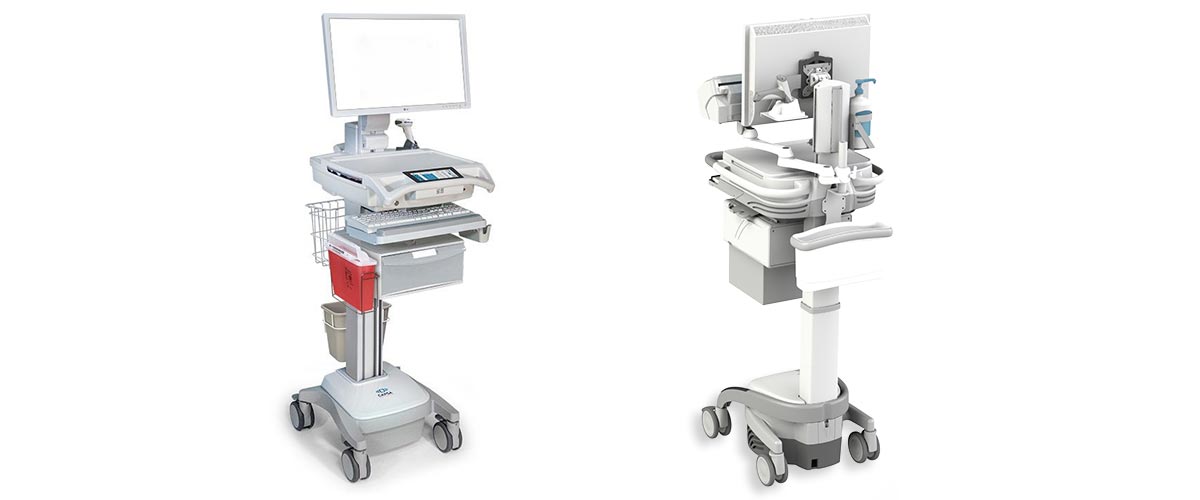
Benefits of Health Information Systems in Hospitals
Implementing a Health Information System in hospitals can lead to a multitude of benefits, enhancing patient care as well as operational efficiency:
- Improved Patient Care: By providing healthcare providers with immediate access to comprehensive patient information, HIS enables more accurate diagnoses, better treatment plans, and improved patient outcomes. The ability to track patient histories and monitor ongoing treatments enhances the overall quality of care.
- Enhanced Data Management: HIS allows for efficient data collection and management, reducing the risk of errors associated with manual data entry and paper records. This leads to more reliable health information and helps ensure compliance with regulatory standards.
- Increased Efficiency: Automating administrative tasks such as billing, scheduling, and patient registration frees up staff time, allowing them to focus more on patient care. This increases overall hospital efficiency and reduces operational costs.
- Facilitated Communication: HIS enhances communication between healthcare providers by allowing them to share patient information seamlessly. This ensures that all members of the care team are on the same page, leading to better-coordinated care.
- Data Analytics and Reporting: Health Information Systems enable hospitals to analyze health data to identify trends, improve patient outcomes, and inform strategic decision-making. This can lead to enhanced quality improvement initiatives and better resource allocation.
- Patient Engagement: With the integration of patient portals and mobile applications, HIS empowers patients to take an active role in their healthcare. Patients can access their medical records, schedule appointments, and communicate with their providers, leading to increased satisfaction and adherence to treatment plans.

The Role of Health Information Systems in Hospital Operations
In a hospital setting, the Health Information System plays a crucial role in various operational aspects:
- Clinical Operations: HIS supports clinical workflows by providing tools for documentation, order management, and patient tracking. This helps streamline processes such as admissions, discharges, and transfers, improving patient flow and reducing wait times.
- Financial Management: By integrating billing and coding processes, HIS helps hospitals manage their financial operations more effectively. Accurate coding and billing are essential for maximizing reimbursement and ensuring the financial sustainability of the organization.
- Regulatory Compliance: Healthcare organizations must comply with numerous regulations, such as HIPAA and Meaningful Use. HIS helps hospitals maintain compliance by ensuring that patient data is secure and that reporting requirements are met.
- Quality Improvement Initiatives: With access to real-time data, hospitals can monitor key performance indicators (KPIs) and implement quality improvement initiatives. This can lead to better patient outcomes and a reduction in healthcare disparities.
- Research and Public Health Reporting: Health Information Systems can facilitate research by providing valuable data for clinical studies and public health reporting. Hospitals can contribute to broader public health efforts by sharing anonymized data with public health agencies.
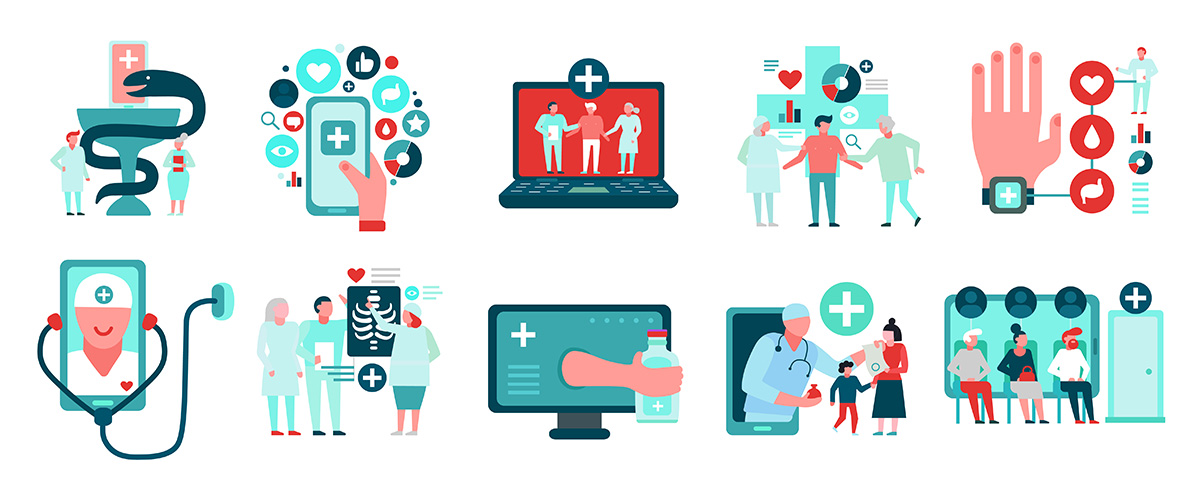
Challenges and Considerations
While Health Information Systems offer numerous benefits, their implementation and use also come with challenges:
- Cost of Implementation: The initial investment in technology, training, and ongoing maintenance can be significant. Hospitals must carefully evaluate their budget and resources when implementing an HIS.
- Data and Privacy: Protecting patient information is paramount in healthcare. Hospitals must ensure that their HIS has robust security measures to prevent data breaches and comply with privacy regulations.
- User Adoption: Successful implementation of an HIS depends on user adoption. Healthcare providers and staff must be adequately trained and motivated to use the system effectively.
- Interoperability: The ability of different systems to communicate and share information is critical for seamless care. Hospitals should prioritize systems that adhere to interoperability standards to enhance data exchange.
- Continuous Improvement: As technology evolves, hospitals must be prepared to adapt and upgrade their HIS. Continuous evaluation and improvement are necessary to keep pace with changing healthcare needs and advancements in technology.
Medical Equipment & Healthcare Solutions by – Innovative Medical
A Health Information System is an integral component of modern healthcare, particularly in hospitals. By efficiently managing patient information, enhancing communication, and streamlining operations, HIS plays a pivotal role in improving patient care and operational efficiency.
Convergint- Innovative Medical’s extensive experience includes providing reliable computer carts and wall-mounted systems that seamlessly integrate with Health Information Systems (HIS). Beyond offering these proven solutions, we excel in developing unique approaches to optimize clinician workflows, ensuring efficient and effective input into EHR and EMR systems.
Connect with Convergint at (800) 968-3135 to learn more about our commitment to delivering exceptional service to our customers through attention to detail & unparalleled customer service.



